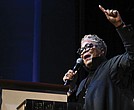City residents’ delinquent taxes pile up
Jeremy M. Lazarus | 7/6/2023, 6 p.m.
Thousands of Richmond residents are ignoring City Hall tax bills on cars, trucks, boats, trailer homes, recreational vehicles and other such personal property.
the result is that millions of dollars that could be used to develop a year-round homeless shelter, create more robust youth programming or address other needs has gone uncollected.
In May, City Hall’s Finance Department reported to City Council that at least $30 mil- lion in personal property taxes was on the books, but was delinquent.
City spokeswoman Petula Burks, responding to a Free Press query, confirmed the report but noted that the delinquency had accumulated over five years.
that would amount to an average of $6 million a year or about 9 percent of the personal property tax collections.
Ms. Burks offered several reasons that tax delinquency remains high: An internal 2019 decision to bring collections in-house rather than continue to employ private companies to pursue payments; the slowdown of collections during the 2020-2022 pandemic; and the continuing shortage of staff in the Finance Department.
Ms. Burks said the administration reversed course in 2022 and began again employing third-party collectors, although total delinquency has yet to show a decline. Still, under state law, the Finance Department must pursue collections for the first six months before the bills can be farmed out.
A review of the department’s monthly reports to City Council indicates that delinquent personal property taxes have been in the $30 million range at least since 2020.
Personal property taxes are a major element of city revenue, though a far smaller source than the tax on real estate, which is projected to generate about $450 million in the 2023-24 fiscal year that began July 1.
According to the city’s budget book, $68 million is projected to be collected from pay- ments on personal property, which is taxed at $3.70 per $100 of assessed value.
That total includes $16.7 million from the state’s expected share of the tax on vehicles, plus $51 million that city residents are projected to pay. The $51 million includes about $7 million that is paid late.
The main flow from revenue is from the tax the city imposes on vehicles, but it also includes 20 other types of property, Ms. Burks stated, ranging from business equipment to boats and mobile homes.
Ms. Burks stated that the Finance Department has made headway in reducing the amount of delinquent real estate taxes. She noted that in June 2021, delinquent real estate taxes were reported at $33.1 million and that just a year later that delinquent total had shrunk to $8.5 million.
“Since the real estate revenue stream is now under better control,” she continued, Finance has expanded its attention to personal property and other delinquencies” in tax payments.







